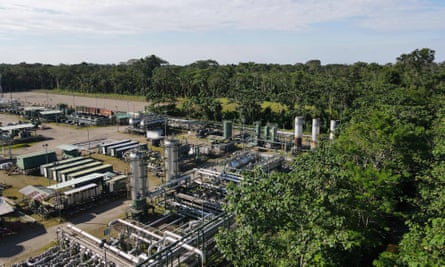Ecuadorians have voted in a historic referendum to halt the development of all new oilwells in the Yasuní national park in the Amazon, one of the most biodiverse regions on the planet.
Voters opted to safeguard the unique biosphere by a margin of nearly 20% with more than 90% of the ballot counted – with more than 58% in favour and 41% against, according to Ecuador’s National Electoral Comission. Voting took place in the first round of presidential elections on Sunday.
The move will keep about 726m barrels of oil underground in the Yasuní national park, which is also home to the Tagaeri and Taromenane people, two of the world’s last “uncontacted” Indigenous communities living in voluntary isolation.
At a time when the climate crisis is intensifying around the world and the Amazon rainforest is fast approaching an irreversible tipping point, Ecuador has become one of the first countries in the world to set limits on resource extraction through a democratic vote.
In a second referendum, citizens in Quito also voted to block gold mining in the Chocó Andino, a sensitive highland biosphere near the capital city, by an even larger margin of about 68% to 31%.

A Petroecuador oil processing centre in Yasuní national park. Photograph: Rodrigo Buendía/AFP/Getty Images
“Today is a historic day! As a Waorani woman and mother, I feel overjoyed with Ecuadorians’ resounding decision to stop oil drilling in my people’s sacred homeland, said Nemonte Nenquimo, an Indigenous Waorani leader and winner of the Goldman prize for the environment.
“Finally, we are going to kick oil companies out of our territory! This is a major victory for all Indigenous peoples, for the animals, the plants, the spirits of the forest and our climate!” she added.
“This victory shows that we humans are taking action to save our planet during these times of climate crisis,” said Leonidas Iza, president of Conaie, Ecuador’s umbrella Indigenous federation.
Pedro Bermeo, founding member of Yasunidos, an activist group that gathered hundreds of thousands of signatures petitioning the referendum, said the vote showed that the “greatest national consensus at this time is in the defence of nature, the defence of Indigenous peoples and nationalities, the defence of life”.
But he warned: “The fight isn’t over. Even if politicians separate us, nature unites us, and we will work together to ensure the government complies with the will of Ecuadorian people.”
The binding referendum permanently bans oil drilling in the Ishpingo-Tambococha-Tiputini (ITT) oil project, also known as oil block 43, located on the eastern edge of the Yasuní national park.
The state oil company, Petroecuador, produces more than 57,000 barrels of oil a day, approximately 12% of Ecuador’s oil production.
The decision comes as a major blow to the fossil fuel industry. Before the vote, economists warned blocking oil drilling in the park would mean more austerity for the cash-strapped country.
Earlier this month, rating agency Fitch downgraded Ecuador’s credit score to CCC+, seven points below investment grade. While it cited the country’s political and security risk, it also estimated a $600m fall in fiscal revenues due to a drop in oil output if the vote succeeded.
The Ecuadorian government is required to halt the operations and dismantle infrastructure within one year, as well as carry out remediation and reforestation.
It is not the first time Yasuní ITT has become a touchstone for the struggle between big oil and protecting the Amazon rainforest in Ecuador. In 2007, the then newly elected president, Rafael Correa, famously offered the world the chance to keep about 850m barrels in the ground at the oilfield.
By creating a fund for half of the oil’s estimated value, $3.6bn, countries would compensate Ecuador for not touching the reserves.
Whether it was a gamble or a publicity stunt, the bid failed to get the money. In 2013, Correa ended the initiative and gave the go-ahead to oil drilling on the 2,000-hectare (4,942-acre) patch of rainforest.
In 1989, Yasuní was designated a world biosphere reserve by Unesco. It covers more than 1m hectares (2.5m acres) and is home to 610 species of birds, 139 species of amphibians and 121 species of reptiles. At least three species there are endemic.
Dan Collyns is a British multimedia journalist based in Peru.


Spread the word